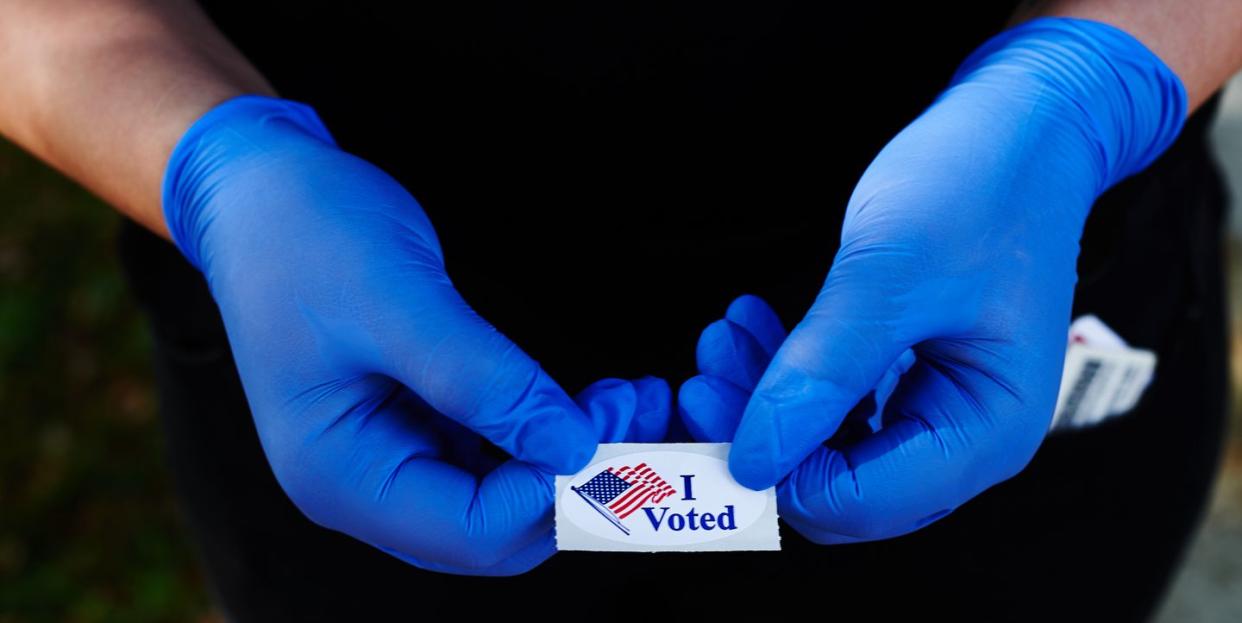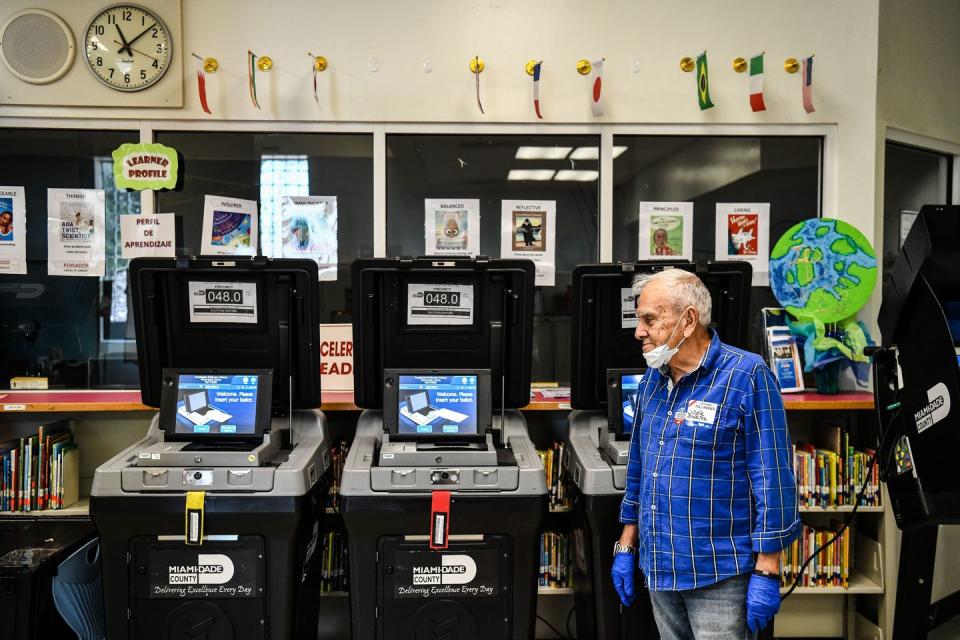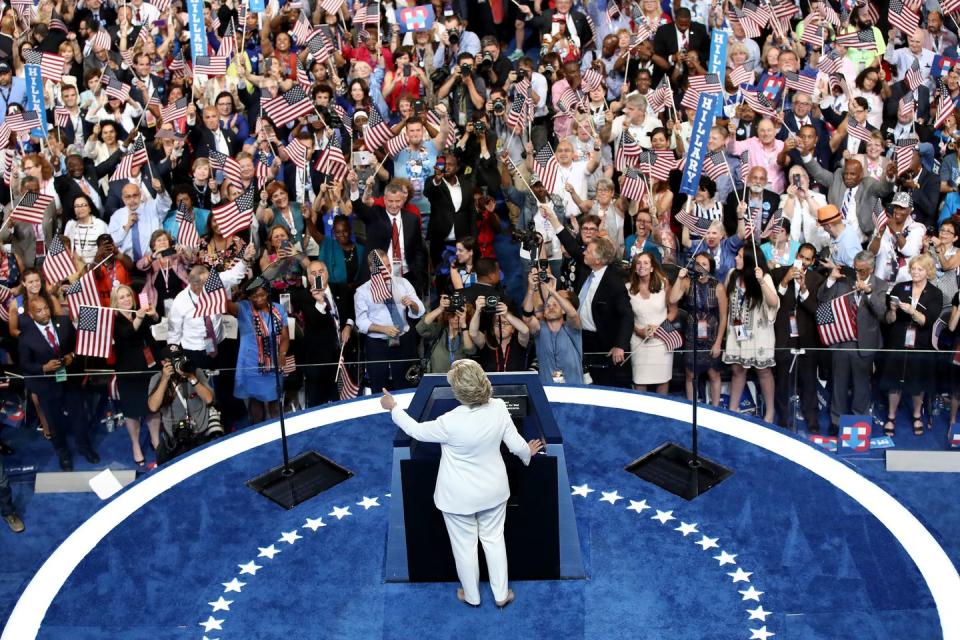Wave of States to Vote Today After Postponed Elections

As ordinary life hovers in limbo while the coronavirus outbreak shuts down businesses, closes borders, depletes medical supplies, forces entire communities to self-isolate, and infects more than one million people across the world, U.S. electoral politics have also reached an impasse.
In addition to the presidential primaries, voters this year are heading to the ballot box to decide on all 435 seats in the House of Representatives, 35 Senate seats, 13 governorships, and multiple state and local elections. Still, elections seem to be among the casualties of both the viral pandemic and the country's incapacity to deal with such a crisis. While some states have gone ahead with their elections as scheduled, others have pushed back their dates. Some lawmakers are also seeking ways to expand early voting and voting by mail-in ballots in time for the November 3 general election.
Which states have postponed their elections? How can one vote early or through a mail-in ballot? Will the Democratic National Convention also be postponed? And is it even possible to cancel the general election?
Here, we answer all your questions about what voting in the United States looks like in the time of coronavirus.
Judge rules that New York's primary election must occur after cancellation.
After the state's Board of Elections, in late April, called off the Democratic presidential primary due to public health fears over the coronavirus pandemic, a district court judge ruled that New York must reinstate the election.
Judge Analisa Torres's ruling came in response to a lawsuit filed by former Democratic presidential candidate Andrew Yang.
Originally, the board decided to remove every Democrat from the ballot except for the presumptive nominee, Joe Biden, after Vermont Senator Bernie Sanders suspended his presidential campaign. The election was likened to a "beauty contest" by some of those on the board.
Douglas Kellner, a commissioner on the board, told CNN, "At a time when the goal is to avoid unnecessary social contact, our conclusion was that there was no purpose in holding a beauty contest primary that would marginally increase the risk to both voters and poll workers."
Since Torres's reversal, Kellner has said that the board is exploring options to appeal her decision.
Although he ended his presidential bid, Sanders said he would remain on the ballot to collect more delegates to "exert significant influence" on the party's platform at the Democratic National Convention, which will take place this summer. Of the issues Sanders championed, Medicare for All was one of the most prominent rallying cries among him and his supporters.
"While we understood that we did not have the votes to win the Democratic nomination, our campaign was suspended, not ended, because people in every state should have the right to express their preference," Sanders said in a statement, in which he denounced the Board of Elections' decision.
Registered New Yorkers can request absentee ballots if they wish to vote by mail.
Which states have postponed their elections?
Arizona, Florida, and Illinois forged ahead with their elections as scheduled on March 17, facing heated criticism in the process. In many precincts, volunteer poll workers and voters found an inadequate supply of cleaning materials, from disinfectant wipes to hand sanitizer, amid the confusion at their polling places. In Florida, two poll workers tested positive for COVID-19 after the election; although, where they contracted the virus is unknown, per the Miami Herald. Wisconsin also held their primary on April 7th.
For the remaining states who have to vote, the response is varied. Some states have made changes to their election schedule, while others are pushing for more absentee ballots to be delivered by their primary's original date. Read on to see whether your state or territory has been affected.
Alabama (Republican primary runoff for Senate Seat)
Alabama's Senate primary runoff election has been postponed from March 31 to July 14.
Alaska
Alaska, whose primary was originally scheduled for April 4, will now vote entirely through mail-in ballots. The deadline for mail-in ballots has been extended to April 10.
See Ballot-by-Mail Instructions
Connecticut
The state's primary has been postponed from April 28 to June 2.
Delaware
The state's primary has been postponed from April 28 to June 2.
Georgia
Georgia's primary, originally slated for March 24, has been postponed to June 9.
See Georgia's Election Calendar
Hawaii
Hawaii voters will now vote entirely by mail. The deadline to send mail ballots is May 22.
See Ballot-by-Mail Instructions
Indiana
The state's primary has been postponed from May 5 to June 2. State officials also said that the option to vote by mail will be expanded.
See Ballot-by-Mail Instructions
Kentucky
Initially scheduled for May 19, Kentucky's primary will now be held on June 23.
Louisiana
Louisiana's primary has been postponed for more than two months, from April 4 to June 20.
Maryland
The state's primary has been postponed from April 28 to June 2.
New York
The state's primary will be held on June 23.
Ohio
The Ohio primary has been postponed from March 17 to April 28. Voters with a disability or without a permanent address will be allowed to vote in person. Otherwise, most will vote through mail-in ballots, with a postmarked deadline of April 27.
See Ballot-by-Mail Instructions
Pennsylvania
The state's primary has been postponed from April 28 to June 2.
Puerto Rico
Originally scheduled for March 29, the territory's election has been postponed by Governor Wanda Vázquez to April 26.
Rhode Island
The state's primary has been postponed from April 28 to June 2, and will take place primarily through mail-in ballots.
See Ballot-by-Mail Instructions
West Virginia
West Virginia's primary, originally scheduled for May 12, will now take place on June 9.
Wyoming
Wyoming, whose primary was originally scheduled for April 4, voters will now vote entirely through mail-in ballots, with a deadline of April 17.
See Ballot-by-Mail Instructions

How do I vote early or with a mail-in ballot?
With election dates and voting deadlines looming, it's best to check as soon as possible on whether or not you can still request an absentee ballot or register for early voting (and thereby avoid crowds in the process).
Vote.org has collected the various dates for absentee ballot deadlines and early voting for each state. And as news on public health guidelines amid COVID-19 develops rapidly, it may also be worthwhile to double-check with your state's election website.
In mid-March, Senators Amy Klobuchar—whose husband contracted the coronavirus—and Ron Wyden also introduced legislation that would expand early in-person voting and no-excuse absentee vote-by-mail to all states. The bill, titled The Natural Disaster and Emergency Ballot Act, would also allow those who did not receive an absentee ballot to vote through a printable ballot that is currently available only for voters in the military or overseas.
"Without federal action, vulnerable Americans are going to have to choose between casting a ballot and protecting their health," Wyden said in a statement. "Vote-by-mail is a time-tested, reliable way for Americans to exercise their constitutional rights, and the right answer to respond to this crisis."
Thanks to all who sent kind words&prayers for my husband John. He has coronavirus & has been in the hospital for pneumonia & low oxygen. He took a good turn, was just released & is now recovering at home! Thanks to those who cared for him &for all front line health care workers. pic.twitter.com/VMVmZCMrIq
— Amy Klobuchar (@amyklobuchar) March 26, 2020
What's happening with the Democratic National Convention?
On April 2, the Democratic National Committee announced that the party's convention would be postponed for a month from mid-July to mid-August. The convention, during which party members formally nominate the presidential and vice-presidential candidates who will run on the November ballot, was originally slated for July 13 to 16.
In March, DNC chairman Tom Perez told Axios that he was not contemplating canceling the convention. "We are working with our state and local partners, and I'm confident that we work a plan that will enable us to have our convention."

Can you still vote now that Joe Biden is the only Democratic candidate left running?
On April 8, Vermont Senator Bernie Sanders announced that he would be ending his presidential campaign, clearing the way for former Vice President Joe Biden to clinch the Democratic nomination.
Still, Sanders, known for his commitment to progressive causes like Medicare for All and the Green New Deal, will remain on the ballot.
In a speech, the self-described democratic socialist said, "I will stay on the ballot and all remaining states and continue to gather delegates, while Vice President Biden will be the nominee. We must continue working to assemble as many delegates as possible at the Democratic Convention, where we will be able to exert significant influence over the party platform and other functions. Then together, standing united, we will go forward to defeat Donald Trump—the most dangerous president in modern American history—and we will fight to elect strong progressives at every level of government."
Is it possible to cancel the general election?
It's highly unlikely that the general election will be canceled, or even postponed.
Although states are allowed to set their own election dates, the presidential election date is set under federal law, meaning that it would take the power and willingness of Congress to change or cancel the November 3 general election.
For reference, the federal statute explicitly states:
The Tuesday next after the 1st Monday in November, in every even numbered year, is established as the day for the election, in each of the States and Territories of the United States, of Representatives and Delegates to the Congress commencing on the 3d day of January next thereafter.
Acclaimed election attorney Marc E. Elias put it more simply on Twitter. "While states can set their own primary days, the federal general election is set by federal statute as the the Tuesday following the first Monday in November," he wrote. "This date cannot be changed by a state nor by the President."
I am getting a lot of questions about the November election. While states can set their own primary days, the federal general election is set by federal statute as the the Tuesday following the first Monday in November. This date cannot be changed by a state nor by the President. https://t.co/jxHCLW4MZ4
— Marc E. Elias (@marceelias) March 13, 2020
You Might Also Like

 Yahoo News
Yahoo News 
